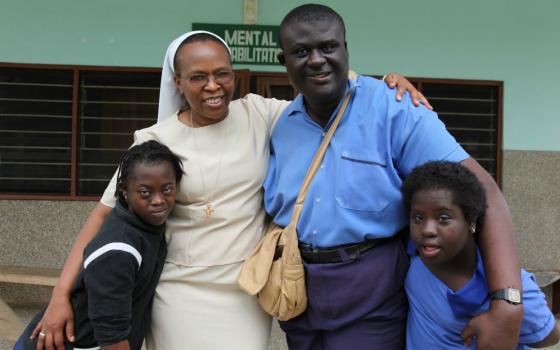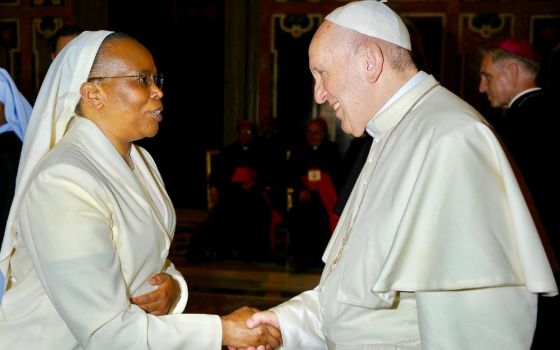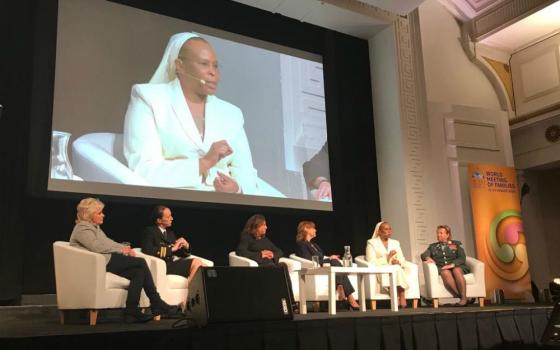As director of the Conrad N. Hilton Foundation's Catholic Sisters Initiative, Sr. Jane Wakahiu oversees one of the largest funders in the world of programs and initiatives focused on Catholic women religious. The foundation recently announced a new five-year strategy for its Catholic Sisters Strategic Initiative to carry on the legacy of Hilton, a hotelier who in his will directed the foundation to give special provision to Catholic women religious.
Before joining the Hilton Foundation in March 2017, Wakahiu served for six years as the executive director of the African Sisters Education Collaborative, established in 1999 by the leaders of four congregations of women religious in Pennsylvania and the presidents of the colleges and universities founded by their congregations to provide greater access to education and professional training to African Catholic women religious. Under her leadership, the collaborative and its initiatives expanded from five countries in Africa to 10.
Born in Nairobi and raised in a small rural village in Kenya, Wakahiu joined the Little Sisters of St. Francis in 1991 and professed her final vows in 2000. She worked as a teacher and administrator at a high school in Kenya, earned a doctorate in human development at Marywood University, taught at the undergraduate and graduate level at various universities, and has written for national and international journals and as a contributor for Global Sisters Report.
The Hilton Foundation's first Catholic Sisters Strategic Initiative strategy, started in 2013, focused on strengthening sisters' congregations internally to improve "membership, leadership and resource outcomes," according to the report outlining the new strategy.
The vision for the Catholic Sisters Strategic Initiative for 2018 to 2022 and beyond builds on that base with four areas of funding: sisters' education, human development, knowledge, and innovation.
"By 2030, the Catholic Sisters Strategic Initiative aims to increase the capacity of sisters to meaningfully address poverty, and elevate the recognition of sisters as moral leaders and voices of change in the global effort to relieve human suffering," the report said. "The vitality of Catholic sisters can be the energy that fuels human development."
To develop the new strategy, Wakahiu and the Catholic Sisters Strategic Initiative team worked with a consultant and held more than 40 focus groups with more than 200 stakeholders in the United States, Italy, Kenya, Uganda, Nigeria, Tanzania and Zambia.
Wakahiu recently spoke with Global Sisters Report, which the Hilton Foundation funds, about the new strategy.
GSR: Recognizing that the strategy is outlined in a 44-page detailed report, what key points would you highlight and what overall message does the strategy convey?
Wakahiu: We want sisters to be recognized as global leaders grounded in spirituality. They respond to the call for vocation, but their reach is for the community and the people they serve. Sisters are social agents and community actors. Long after international development partners have left an area, sisters remain among and with the people.
The strategy is divided into four portfolios. The first, sister education, is strengthening the capacity of sisters internationally and within their congregation. This is education across the board: leadership training, capacity-building, and ongoing formation. We are looking for a quality of life for sisters over the spectrum of their lifetime.
In the developing world, sisters are also playing a significant role in those institutions that are helping in the human development arena. We can focus on so many issues that the sisters are addressing, but in terms of the strategy, we want to target the next generation of individuals: youth ages 15 to 25. Sisters are working with people in this age, providing education, health care, entrepreneurship and [guidance] on the issue of human trafficking.
People who are particularly vulnerable to human trafficking are in that age when they are looking for jobs, maturing, beginning their own families or becoming what they want to be in their lives. We want to support sisters working with this particular age group because of the issues this particular age group is facing.
We are also asking ourselves bigger questions: What is causing human trafficking? What are those push factors in those countries of origin? What can we do in those countries of origin to help young men and young women to remain in those countries?
One issue that has been coming up often is poverty. We have to look at poverty alleviation from a cross-cultural and cross-sectoral perspective. We can use media to educate young women and men on migration and its consequences, that leaving countries is not the best thing even if you are promised a job [in another country]. How can we work with the government and schools to provide a holistic education on the particular issue of human trafficking? That is why we are picking that particular age group.
In the Phase I strategy, our central focus was vocation. I was going back and asking myself, how did a sister attract other women to enter religious life in the past? They attracted women because they were present in those places, in those institutions [where young women were]. If we bring young people who are making decisions in their life into contact with sisters and what the sisters are doing, they will become more knowledgeable and more aware of religious life. They may decide to enter. If they don't, then they respond to their call to be parents and live their life holistically. That's why we're focusing now on human development.
We are also focusing on knowledge and knowledge management. In the developing world, like in Africa, there are congregations starved for data to make decisions about their own congregations and to communicate with other congregations, to be able to study and see what congregations are growing, what is causing them to attract more members. What are the challenges they are facing? What do we mean by "vitality"? Does that mean only membership, or does it also focus on finances and the wellness of the members, and are members taken care of in the long term and future planning for the congregation? We want to produce data that sisters can use in decision-making. We want to begin by laying the groundwork for database development.
The last area is innovation. We are challenging ourselves to have fresh ideas, especially to solve problems, including financial problems that are facing congregations of women religious. For example, in the U.S., the issue of aging sisters was repeated in our interviews. Some are merging their provinces, some are merging their regions, some are changing governance systems. How can we support those congregations, and if they develop good governance systems, how can we teach those in the developing world, like in Africa or Mexico, to begin planning for their future so they aren't facing the same challenges that the U.S. is facing today? In Africa, it may be land use: How can we help congregations to make the maximum use of the land they have or maybe change some of their social enterprises so they bring income and solve some of their long-term problems and be able to care for their aging sisters? There will be several pilot projects.
Each portfolio is on its own but also informs the others. Capacity-building, communication, networking and collaboration are cross-cutting [among all the portfolios]. We encourage collaboration among grantees and congregations but also nongovernmental organizations in the same areas.
The human development portfolio references collaboration with the Conrad N. Hilton Fund for Sisters. Is this new, and how significant is it?
The Hilton Fund for Sisters and the Hilton Foundation share the same history in Conrad Hilton, but we are different in how we do business. We are strategic grant-makers and partner with organizations that will be contributing to address social and economic issues. The Hilton Fund for Sisters is a responsive grant-maker: It allows people to apply and gives $10,000 to $15,000 for the needs these organizations request.
We work with sisters and their organizations to address root causes of social issues. The idea is not to just build capacity for the individual sister, but also to support congregations and conferences to help solve problems for society and congregations.
The Hilton Fund for Sisters has a lot of data, so how can that data be used to see the emerging trends that we need to focus on? We could collaborate in developing strategic areas to focus on: health, education, human trafficking. We will continue exploring ways to leverage each other's efforts.
While the strategic plan is for 2018 to 2022, the report makes a point of going beyond that to 2030 and relates the human development work of Catholic sisters to the United Nations' sustainable development goals (SDGs). Why?
Five years is a short time to address systemic issues. The time to plan and execute and gather information took almost a year, and developing the strategy took another seven to eight months.
The idea is to have a vision that has capacity to go another few years [beyond the five-year plan]. It is divided according to a budget plan, and within five years, we will assess what is doing well and will continue. If it's not working well, we will adjust.
Well before the SDGs were launched in 2015, our sisters were working on human development. Our sisters have always been working in health care to address the needs of the marginalized and vulnerable. The SDGs are a framework of thinking. We would like to amplify sisters' work to be recognized as global actors in the issues articulated in some of the SDGs: poverty alleviation, quality education, water and sanitation, health, and gender issues.
The foundation has supported Religious at the U.N. because we want the sisters to be recognized and be supported by other NGOs. They are often seen as people of faith but not seen as playing a significant role in development.
In its initial phase, the Catholic Sisters Strategic Initiative made 92 grants totaling $105 million to 62 organizations since its launch in 2013. How do you see that landscape changing with this second phase?
We will be asking more about data: How do you contribute to making a difference in the areas you are focusing on? We want a lot of relevant data, so we will work to build the capacity of our partners.
We will continue to fund some of the organizations, but we will also expand partnerships because we are focusing on more areas. We will continue to evaluate partners with the current strategy. For some, there are possibilities of changing the focus.
In October, we are having a convening to share our strategy with our partners. How do you see your organization or program fitting in this strategy? How will you evaluate your work? It is a conversation. We need partners to work with us in reaching out to the communities. The Hilton Foundation has [to make changes] in an ethical and respectful way. We cannot pull the plug; we want our partners to continue the work they do, so we would support and reach an agreement before exiting.
You've held a number of key positions, including leading the Kenyan conference of women religious and spending six years as director of the African Sisters Education Collaborative. How do you view the challenge and opportunity as the director of the Catholic Sisters Strategic Initiative?
In any position, my call is to serve: God, what are you asking of me now, and what do I need to do? What is the mission of the organization, and how can I help in delivering that mission? I have 30 years in my vocation and am in a position that has provided an opportunity to create and be a bridge for others. How can I build a bridge to support the Catholic sisters in their work?
I also realized there are many experts. I do not work alone, I work with others, staff at the foundation. When I've reached out to the Leadership Conference of Women Religious, to the Congregation of Major Superiors of Women Religious, to the International Union of Superiors General, to the Dicastery for Integral Human Development, I have received overwhelming support on how to make sense of all that information to create a strategy to help bring sisters to the next level.
[Gail DeGeorge is editor of Global Sisters Report. Her email address is gdegeorge@ncronline.org. Follow her on Twitter: @GailDeGeorge.]




